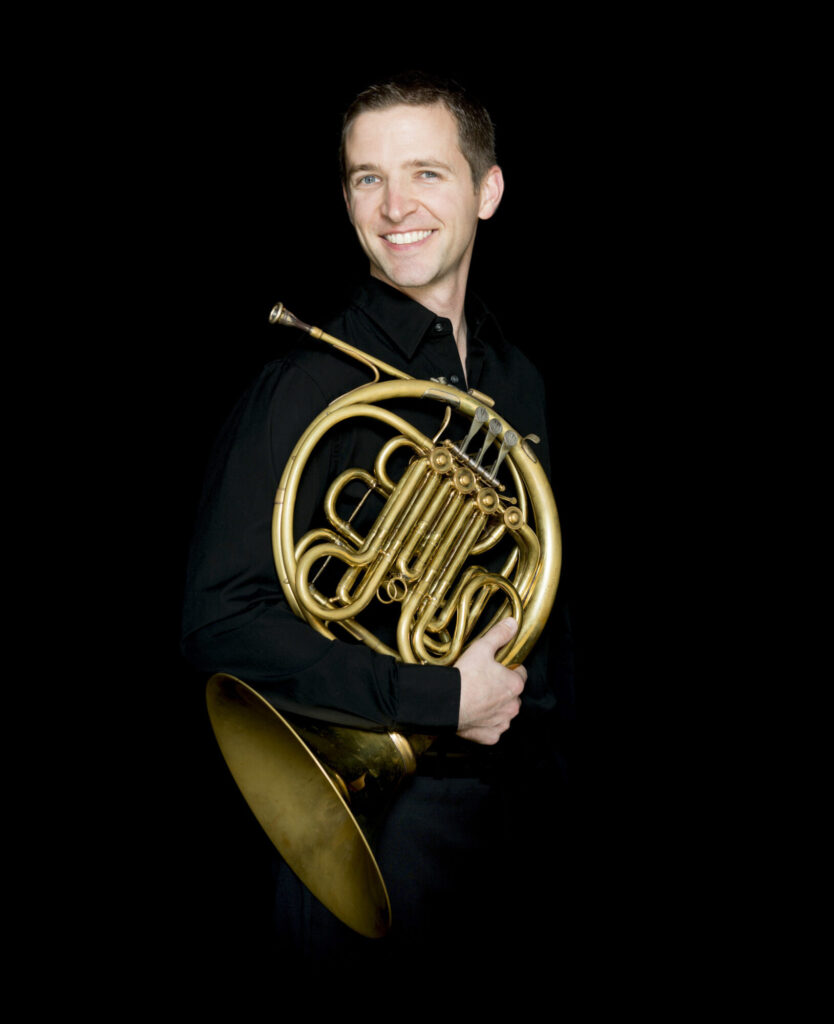Pro Arte charmingly explores music on nature (mostly) under Jeff Beal

Michael Winter performed Strauss’s Horn Concerto No. 1 with the Pro Arte Chamber Orchestra Sunday in Newton.
Tucked away at the Second Church in Newton, the Pro Arte Chamber Orchestra delivered a charming meditation on music and nature on Sunday afternoon.
Led by composer and guest conductor Jeff Beal, Pro Arte offered a performance that displayed the strength of the ensemble and made a powerful argument for the pleasures of a chamber orchestra in a culture that favors grandiose musical gestures.
The program opened with Beal’s Overture to Pollock—a film on the life of painter Jackson Pollock. A composer of music for film and television, Beal is perhaps best known for his score for the Netflix show House of Cards. Though the piece did not align with the program’s stated theme, its energy and color gave the orchestra a chance to coalesce. The Overture, which reflected Pollock’s famous “drip technique,” required a cleanliness of articulation and highlighted the skill and unity both of the individual sections and the ensemble at large.
Following the overture was Richard Strauss’s Horn Concerto No. 1—an early effort by the composer and a standard of the French horn repertoire.
Boston Symphony Orchestra member Michael Winter compelled attention as Sunday’s soloist. The concerto requires both technical facility and beautiful legato playing over a wide range, and Winter accomplished all this, from the singing lines of the first movement to the agility of the third movement.
The Pro Arte musicians hit their stride in the concerto, and the balance and blend of the orchestra, even in its supporting role, was stunning under Beal’s direction. The timbre that the ensemble managed to achieve preserved the richness of Strauss’ compositional style and the clarity that the chamber orchestra offers as a medium.
After intermission, the program continued with Beal’s The Great Circle. Inspired by the mudslides and fires that were taking place in California at the time of the work’s composition. Each of the work’s five movements is devoted to one of the four natural elements—earth, air, fire, and water—with a final movement, “re(Birth).”
The orchestra performed the piece well as they rendered each element, emphasizing both the destructive and healing power of these natural forces. Principal clarinet Ian Greitzer was excellent in his solos in movements one and four. The score highlighted the strength of the winds and brass in general, with the horns showing to great advantage in “Water.” The strings shone too, with perfectly unified pizzicati in the second movement, “Air,” and the beautiful opening of movement 5 “re(Birth),” which recalled the Adagietto of Mahler’s 5th symphony.
The concert concluded with Respighi’s Gli ucelli (The Birds)—a 19th century retooling of musical depictions of birdsong from the 17th and 18th centuries.
The Pro Arte orchestra proved most impressive in this more classical work, and Gli ucelli was delightful, balancing the charm of the 18th century with the richness of Respighi’s 19th-century aesthetic. Beal’s playful interpretation struck the perfect note, preserving both the lightness of musical birdsong and the formal solidity of the 17th century pieces that form the work’s foundation.
Any piece that renders birdsong must feature the wind section, and here every soloist performed beautifully. Principal oboe Nancy Dimock, joined by harpist Krysten Keches, sang in “La Colomba” (“The dove”). Principal flute Ann Bobo, principal bassoon Jensen Ling, and principal horn Robert Marlatt, crooned in “L’Usignuolo” (“The nightingale”). The strings and percussion were solid throughout, deftly navigating the acoustic of the space.
Pro Arte Chamber Orchestra presents “Strings of Light,” a program of Vivaldi, Vasks, Esmail, and Beethoven on June 9 at the Second Church in Newton. proarte.org
Posted in Performances